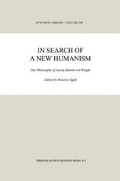Abstract
Aristotle is often blamed for developing the theory of syllogism instead of writing a Greek version of Frege’s Begriffsschrift. With hindsight, however, one must admit that he had a good reason for doing so: syllogism, and more generally monadic logic, is decidable whereas polyadic and even dyadic logic is undecidable. As van Heijenoort [10] points out, in that respect Aristotle’s theory of syllogism was a lucky strike because Aristotle hit into a part of logic where quantifiers are inessential: monadic logic can be translated into a quantifier-free calculus. In another respect, however, Aristotle’s restriction to the theory of syllogism was unjustified: monadic logic is decidable only in principle, not in practice. All known decision procedures for it are too complex to be feasible.
Access this chapter
Tax calculation will be finalised at checkout
Purchases are for personal use only
Preview
Unable to display preview. Download preview PDF.
Bibliography
H. Behmann, ‘Beiträge zur Algebra der Logik’, Mathematische Annalen 86 (1922), pp. 163–229.
G. S. Boolos-R.C. Jeffrey, Computability and Logic,Cambridge University Press, London 1980.3
P. Bernays-M. Schönfinkel, ‘Zum Entscheidungsproblem der mathematischen Logik’, Mathematische Annalen 99 (1928), pp. 342–372.
A. Church, Introduction to Mathematical Logic, Princeton University Press, Princeton 1956.
H. B. Enderton, A Mathematical Introduction to Logic, Academic Press, New York 1972.
J. Herbrand, ‘Investigations in proof theory’, in Logical Writings ( W. Goldfarb ed.), Reidel, Dordrecht 1971.
G. Hunter, Metalogic. An Introduction to the Metatheory of Standard First-Order Logic, Macmillan, London 1971.
D. Hilbert-P. Bernays, Grundlagen der Mathematik I,Springer-Verlag, Berlin 19682.
W. V. Quine, ‘On the logic of quantification’, Journal of Symbolic Logic 10 (1945), pp. 1–12.
J. van Heijenoort, ‘Subject and predicate in Western logic’, in Selected Essays, Bibliopolis, Naples 1985, pp. 17–34.
G. H. von Wright, ‘On the idea of logical truth (I)’, in Logical Studies, Routledge & Kegan Paul, London 1957, pp. 22–43.
Author information
Authors and Affiliations
Editor information
Editors and Affiliations
Rights and permissions
Copyright information
© 1999 Springer Science+Business Media Dordrecht
About this chapter
Cite this chapter
Cellucci, C. (1999). The Decidability of Syllogism. In: Egidi, R. (eds) In Search of a New Humanism. Synthese Library, vol 282. Springer, Dordrecht. https://doi.org/10.1007/978-94-017-1852-3_19
Download citation
DOI: https://doi.org/10.1007/978-94-017-1852-3_19
Publisher Name: Springer, Dordrecht
Print ISBN: 978-90-481-5260-5
Online ISBN: 978-94-017-1852-3
eBook Packages: Springer Book Archive

